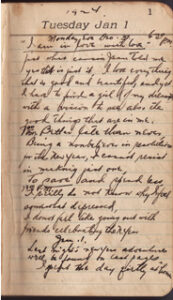 [Note: This entry appears on the Jan 1 page of the diary,
[Note: This entry appears on the Jan 1 page of the diary,
with the date handwritten at the top of the page.
The entry for Jan 1 appears at the bottom of this page and
continues in an addendum page at the back of the book.]
Monday Eve Dec. 31 6:30 pm
“I am in love with love”
just what cousin Jean told me
yes that is just it. I love everything
that is good and beautiful, and yet
I have to find a girl (of my dreams)
with a vision to see also the
good things that are in me.
7:00 pm. Better late than never,
Being a nonbeliever in resolutions
for the New Year, I cannot resist
in making just one,
To save and spend less.
7:30 pm I really do not know why I feel
somewhat depressed,
I don’t feel like going out with friends
celebrating the N. Year.
————
Matt’s Notes
I’m not sure why my grandfather (I knew him as “Papa”, hence the title of this site) time-stamped each paragraph in this inaugural entry, but I like it because it gives some shape to the course of his evening. I picture him getting ready to go out, thinking about meeting his friends, maybe running a bit late as he figures out just how he wants to record his thoughts. Is he sitting at a desk? Probably not — at the time he started this journal he was living in a friend’s tenement apartment, and I can’t imagine that he had much space for himself, let alone a desk. He must have used a fountain pen.
He was a big fan of anything dramatically sentimental (he loved opera, Tchaikovsky, was touched by patriotic holidays) so the impending New Year inspires a fitting statement of self-reflection: “I am in love with love”. He views his own loneliness as something poetic, a dreamy quest to find someone who shares his love of beauty. It’s a little sad and a little sweet, but it reflects something essential about his character that anyone who knew him attests to: a remarkable ability to see the good in people and in the world.
Considering his life up until then, he had every right to be bitter and cynical. He grew up in the town of Snyatyn, an Austro-Hungarian Jewish ghetto where pogroms and poverty were real, daily threats (I don’t know about you, but when I get my time machine working I’m not going back there to sport my circumcision). Though he was a factory worker who lived in relative poverty, he was under constant pressure from the European brothers and sisters who resented his presumed unwillingness to share the untold riches he was surely earning in America. Wanting to be loved for his gentle soul, he was beholden to a social system where matrimonial transactions hinged on financial, not spiritual, currency. How could he have maintained his romantic outlook at all?
Of course, his optimism did not go unscathed in the years before he started his diary. You can’t really blame him when he says, sixty minutes after penning his “I am in love with love” statement, that he doesn’t feel like seeing his friends and that “I really do not know why I feel somewhat depressed”. In fact, this single diary entry, with its sudden transition in tone, shows us at once the struggle that would continue to tug him all year: the poet’s love of beauty versus the realist’s creeping sadness, brought to the surface as he reflects on the approaching milestone of New Year’s Day, 1924.
As I sit and write this on December 31, 2006, I think I’m a lot like my Papa, a “nonbeliever in resolutions” who cannot help but set down a hope or two for the new year. My main one at this moment is that I can do justice to this diary. I think a lot of people will find it touching, or at least worth reading as a historical curiosity, which is one reason why I’m publishing it in this way. And, naturally, I think it’s fascinating because it belonged to my Papa. Though he died when I was only four and I remember just a handful of moments with him, his gentleness, his steadying effect on my family and his capacity to feel thrilled at my every gesture still fill me with a glow; in a way, I remember him more as a feeling than as a person, with a four-year-old’s purity of thought and unconditional fascination.
A few years after he died, I dreamed that he came to me in the night and sat on my bed to chat with me, to explain that he was gone forever but that he was still with me. After that, I would go to bed each night wishing that I’d dream of him again, but it never happened. Maybe this diary is so important to me because, even though he writes it as a much younger man than I am now, I can still find traces of his mature self in his words, and by reading, retyping and sharing it I can find, somewhere in its pages, that last moment with him that I never had.